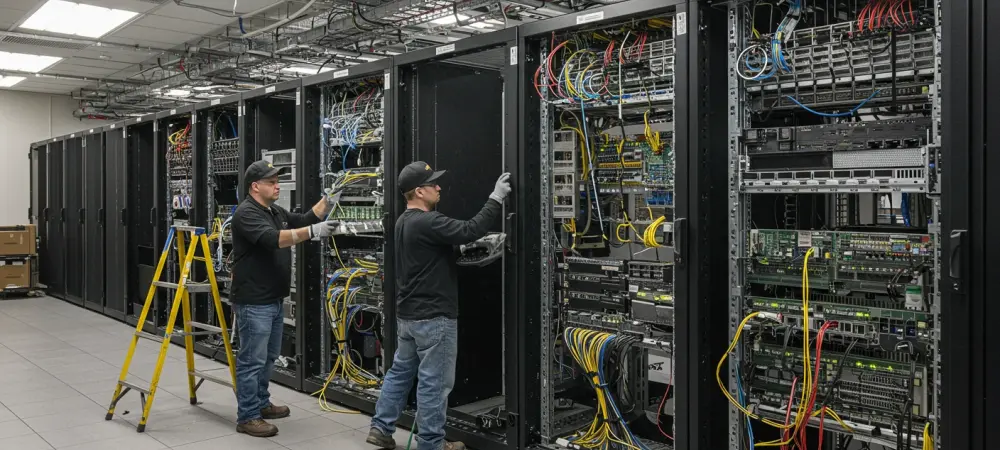Setting the Stage for a Market Shift
Imagine a burgeoning industry, fueled by an insatiable demand for digital infrastructure, suddenly hitting a wall of resistance in a key growth region, and you have the current state of the data center market in Virginia. Often hailed as the global hub for such facilities, Virginia faces a significant challenge following Diode Ventures’ unexpected retreat from its ambitious 500-acre Roxbury Technology Park project in Charles City County, just 20 miles east of Richmond. As a subsidiary of Black & Veatch, Diode Ventures’ decision to abandon this development has sent ripples through the sector, raising questions about the sustainability of rapid expansion in semi-rural areas. This market analysis delves into the underlying trends, challenges, and future projections for data center growth, using this high-profile withdrawal as a lens to explore broader implications for developers and regional economies.
Dissecting Market Dynamics and Key Trends
Virginia’s Data Center Boom: Opportunities and Obstacles
Virginia remains a powerhouse in the data center industry, with Northern Virginia alone hosting a significant share of global facilities due to its proximity to major internet exchange points and attractive tax incentives. This growth has spilled over into surrounding areas like Charles City County, where Diode Ventures aimed to capitalize on available land and economic potential. However, the market is witnessing a saturation point in certain regions, with increasing scrutiny over resource allocation and community impact. The tension between economic benefits—such as job creation and infrastructure investment—and local opposition highlights a critical challenge for the sector. Developers must now navigate a landscape where expansion is no longer guaranteed, even in a state historically welcoming to such projects.
Community Resistance as a Market Disruptor
A pivotal trend shaping the data center market is the rise of community pushback, particularly in less urbanized areas. In Charles City County, residents voiced strong concerns over environmental risks, including high energy and water consumption, alongside noise and light pollution from the proposed Roxbury Technology Park. Transparency issues, such as the lack of clarity about the project’s end user, further fueled distrust. This resistance mirrors a broader pattern across Virginia and other states, where local advocacy groups are demanding a say in large-scale developments. For the market, this signals a shift toward greater stakeholder engagement, as failing to address these concerns can derail even well-planned initiatives, as seen with Diode Ventures’ abrupt exit.
Infrastructure Readiness: A Hidden Market Barrier
Beyond social dynamics, logistical constraints are emerging as a significant hurdle for data center expansion. Diode Ventures cited difficulties in securing adequate power supply and municipal support as key reasons for withdrawing from the project, despite earlier progress with revised proffers. Data centers require immense electrical capacity, often straining local grids in rural areas not yet equipped for such demand. This infrastructure gap poses a systemic risk to market growth, particularly in regions outside established hubs. Developers may need to reassess site selection criteria, prioritizing locations with pre-existing utilities or investing in partnerships with local authorities to mitigate these bottlenecks.
Forecasting the Future of Data Center Investments
Adapting to a New Community-Centric Landscape
Looking ahead, the data center market in Virginia is likely to undergo a strategic pivot. Projections suggest that developers will increasingly target areas with minimal community resistance and robust infrastructure, potentially shifting focus back to urban-adjacent zones or regions with prior zoning approvals. The backlash in Charles City County indicates that rural expansion may face consistent delays unless engagement models evolve. Industry trends point toward integrating community feedback early in the planning process, with companies possibly allocating resources for public consultations and impact studies to build trust. This adaptation could redefine how projects are pitched and executed over the next few years.
Sustainability as a Competitive Edge
Another critical forecast for the market involves the growing emphasis on sustainability. With environmental concerns at the forefront of opposition, data center operators are expected to prioritize renewable energy integration and energy-efficient designs to appease both regulators and residents. Market analysis indicates that firms adopting green technologies could gain a competitive advantage, particularly as state and federal policies tighten around carbon footprints. Investments in sustainable practices, though initially costly, may become a deciding factor in securing approvals and maintaining long-term viability in contested areas like Virginia’s semi-rural counties.
Regulatory and Economic Implications
The regulatory landscape is also poised to influence market trajectories. Increased scrutiny over power usage and environmental impact could lead to stricter guidelines, potentially slowing project timelines but ensuring more balanced growth. Economically, while data centers promise significant returns through job creation and tax revenue, the cost of delays and cancellations—as exemplified by Diode Ventures’ withdrawal—may deter smaller players from entering the market. From 2025 to 2027, expect a consolidation trend where only well-prepared developers with strong community and utility partnerships thrive in this evolving environment. Larger firms with deeper resources might dominate, reshaping the competitive field.
Reflecting on a Pivotal Market Moment
The retreat of Diode Ventures from Charles City County marked a turning point for the data center industry in Virginia, exposing vulnerabilities in unchecked expansion strategies. It revealed how community opposition and logistical shortcomings could upend even promising ventures. For stakeholders, the path forward involves actionable steps: developers need to embed transparency and sustainability into project planning, while local governments must facilitate clearer communication channels and infrastructure readiness. This case also underscored the value of proactive partnerships between industry and communities to prevent costly setbacks. Ultimately, the lessons drawn from this episode offer a blueprint for navigating similar challenges, ensuring that future growth aligns more closely with regional priorities and capabilities.

